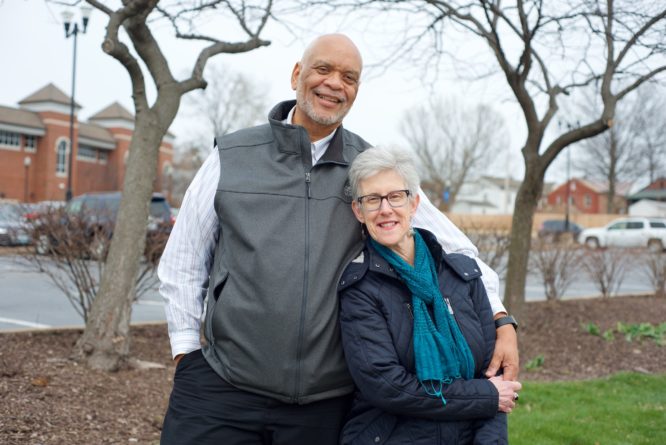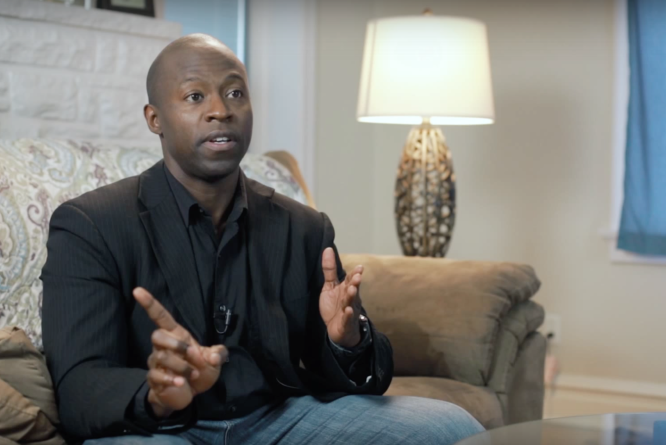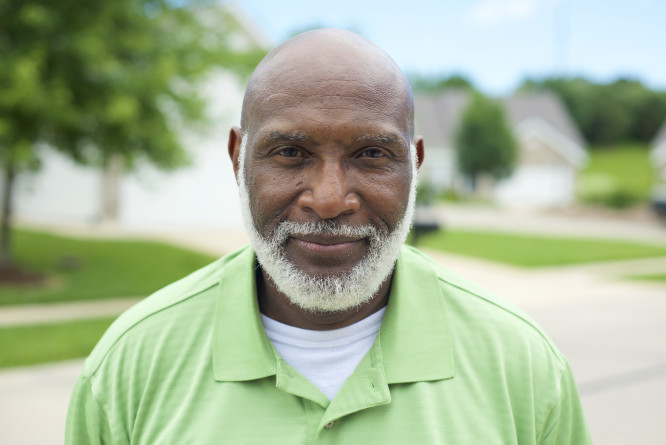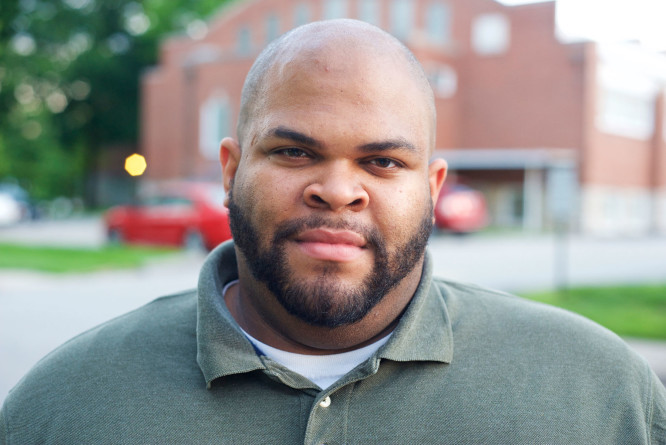Joshua Jones – #FiveYearsLater #STL2039
Community stories marking the five-year milestone after the killing of Michael Brown Jr. and the Ferguson uprising. Residents reflect on where we’ve been, where we are, and where we’re going.
Ned – #FiveYearsLater #STL2039
Community stories marking the five-year milestone after the killing of Michael Brown Jr. and the Ferguson uprising. Residents reflect on where we’ve been, where we are, and where we’re going.
Rudy and Mary – #STL2039
Sharing the visions of St. Louis residents for a future St. Louis—in 2039—where Racial Equity is the reality and what they’re doing to achieve it today. #STL2039
John and Jamala – #STL2039
Sharing the visions of St. Louis residents for a future St. Louis—in 2039—where Racial Equity is the reality and what they’re doing to achieve it today. #STL2039
FTF Co-Chairs and Community Partners Call for Swift Policy Action
Residents Call for Policy Change, Regional Leaders Must Rise to the Challenge Forward Through Ferguson co-chairs, Rebeccah Bennett and Zachary Boyers, and 30 community partners call on policy and decision makers to deliver swift action on Ferguson Commission Calls to Action. Read the full statement on Medium, or download a pdf here. “Unfortunately, we’ve been…
Opportunity for a New Approach to Public Safety in St. Louis
An open letter to Mayor Lyda Krewson from Rebeccah Bennett and Zachary Boyers, Co-chairs of Forward Through Ferguson, on the public safety opportunity in front of our region. Click here to download a pdf of the open letter. Mayor Krewson, The retirement of Police Chief Sam Dotson represents a new day for public safety in St. Louis….
The Best Way to Understand It Is to Experience It
In a four part series Josh Walehwa, who’s brother is a police officer, shares his experiences with law enforcement and vision for the future of St. Louis. Check back as additional parts of his story are released. Part 1 The Best Way to Understand It Is to Experience It – Investigatory Stops “We want the…
Know your new rights
Know the new rights secured by recent legislation to municipal courts and government, namely 2015 Missouri Senate Bill 5, which is now law.
Build new relationships with law enforcement
Discover others ways to engage law enforcement officials
Making ‘Civics’ a Verb
Jauquin Holmes is one of several St. Louisans who’ve made showing up a priority. Part of it stems from his connection with the area where Michael Brown was shot, and unrest has occurred.
Summary of Terms
Ability to Pay A borrower’s capacity to fully pay his loan obligations. Source: Businessdictionary.com, https://www.businessdictionary.com/definition/ability-to-pay-principle.html Associate Circuit Court A division of a Missouri State court, which can hear cases with amounts up to $25,000. This includes small claims cases. Source: Missouri Courts, https://www.courts.mo.gov/hosted/circuit13/other/definitions.htm Circuit Court A court in which trials occur. Within a circuit court,…
Collect Municipal Court Debts Like Civil Debts
Municipal courts shall collect debts in a manner consistent with other civil debts.
Foster Positive, Proactive Police Interactions with Youth
Communities shall affirm and recognize the voices of youth in community decision making, facilitate youth-led research and problem solving, and develop and fund youth leadership training and life skills through positive youth / police collaboration and interactions. (Adapted from Recommendation 4.7 from the Presidential Task Force on 21st Century Policing final report)
Establish Search and Seizure Procedures for LGBTQ and Transgender Populations
Law enforcement agencies statewide shall establish search and seizure procedures related to LGBTQ and transgender populations. (Adapted from Recommendation 2.12 of Presidential Task Force on 21st Century Policing report)
Include Implicit Bias and Cultural Responsiveness Training in POST
POST shall ensure both basic recruit and in-service training incorporates content around recognizing and confronting implicit bias and cultural responsiveness. • This shall occur with the assistance of advocacy groups that represent the viewpoints of communities that have adversarial relationships with law enforcement. • Law enforcement agencies statewide shall implement training for officers that cover…
Prohibit Profiling and Discrimination
Law enforcement agencies shall adopt and enforce policies prohibiting profiling and discrimination based on race, ethnicity, national origin, religion, age, gender, gender identity / expression, sexual orientation, immigrant status, disability, housing status, occupation, or language fluency. (Adapted from Recommendation 2.11 and Action Item 2.11.1 of Presidential Task Force on 21st Century Policing report)
Enact Officer Identification Policies
Law enforcement agencies statewide shall adopt policies requiring officers to identify themselves by their Department Serial Number (DSN) and provide that information in writing to individuals they have stopped. (Adapted from Action Item 2.11.1 and Recommendation 2.11 from the Presidential Task Force on 21st Century Policing final report)
Include Social Interaction Training in POST
POST shall ensure that basic police officer training includes lessons to improve social interaction as well as tactical skills. Topics shall include critical thinking, social intelligence, implicit bias, fair and impartial policing, historical trauma, and other topics that address capacity to build trust and legitimacy in diverse communities and offer better skills for gaining compliance…
Include New Approaches in Anti-Bias Training for Police
Police departments across the state shall revise their anti-bias training protocols by applying new learning approaches to understand bias and its influence on community service.
Train Police to Better Engage Citizens
Police departments across the state shall revise their training policies to emphasize experience-based self-awareness through continually different personal interactions with community representatives, leaders, and youth.
Build Trust Among Youth
Communities and law enforcement agencies shall work to build trust between youth and police by creating programs and projects for positive, consistent, and sustained interaction between youth and police. (Adapted from Action Item 4.7.1 from the Presidential Task Force on 21st Century Policing final report)
Adopt Alternative Strategies for Juvenile Discipline
Law enforcement agencies shall work with schools to encourage the use of alternative strategies that involve youth in decision making, such as restorative justice, youth courts, and peer interventions. School Resource Officers and other school-based law enforcement shall receive periodic training and certification every two years in antibias actions and cultural responsiveness for school aged youth. (Adapted from Action Item 4.6.3 from…
Reform Juvenile Disciplinary Procedures and Practices
Communities shall adopt policies and programs that address the needs of children and youth most at risk for crime or violence and eliminate aggressive law enforcement tactics that stigmatize youth and marginalize their participation in schools and communities. (Adapted from Recommendation 4.6 from the Presidential Task Force on 21st Century Policing final report)
Engage Youth in Joint Training
Law enforcement agencies across the state shall engage youth and communities in joint training with law enforcement. (Adapted from Action Item 4.5.2 from the Presidential Task Force on 21st Century Policing)
Seek Civilian Input on Police Programs and Policies
Law enforcement agencies statewide shall schedule regular forums and meetings where all community members can interact with police and help influence programs and policy. (Adapted from Action Item 4.5.1 from the Presidential Task Force on 21st Century Policing final report)
Foster Police-Community Interactions in Schools
Law enforcement agencies statewide shall create opportunities in schools and communities for positive non-enforcement interactions with police.
Engage Civilians in Police Operations
Police departments across the state shall integrate independent civilian evaluation into routine departmental operations, including input on individual officer-citizen interactions and policing strategic plans.
Facilitate More Positive Police-Community Interactions
Police departments across the state shall revise policies directing internal administration to facilitate more positive police-community interactions, social service experience for officers and required community-building field time.
Train for Incidents Requiring Multiple Law Enforcement Agencies
Police departments across the state should implement community-wide, reality-based training for incidents requiring the involvement of multiple law enforcement agencies.
Establish Communication Protocol for Demonstrations
In the instance of spontaneous demonstration: Initial law enforcement response shall be as minimal as safety permits, to assess the situation, attempt to identify a “leader” and to initiate communication (if safety permits.) Law enforcement shall designate a liaison and/or tactical command person to communicate with the leader or demonstrators’ designated points of contact and ensure lines of communication are…
Develop a Comprehensive Demonstration Response Plan
Direct County and City Governments across the state to differentiate emergency and demonstration approaches by consulting with community members, community organizers and law enforcement officials to design a publicly available Demonstration Response Plan that: First prioritizes the preservation of human life and adheres to the principles of community policing, guardianship, and the protection of human and constitutional rights (Adapted from Rules of…
Require Psychological and Bias Screenings
All officers hired by a municipal or County police department shall undergo a full psychological screening, in conjunction with a bias screening, by a Countyapproved psychiatrist or psychologist. New hires shall also receive a full background investigation. All police departments shall contact Missouri POST to review the license status and any known disciplinary history of…
Support Officer Well-Being
The State of Missouri’s respective departments shall implement annual, independent, and confidential mental health and physical fitness checks and nutritional support for officers. (Adapted from Action Item 6.1.2 of Presidential Task Force on 21st Century Policing report)
Provide Mental Health Services for Officers
The State of Missouri shall support law enforcement agencies with research and funding to offer tailored, independent, and confidential mental health treatments to officers, including a toll-free mental health hotline specifically for officers, anonymously connecting callers to officers who are not in the same agency and who could refer the caller to professional help if…
Conduct Peer Review of Critical Incidents
Law enforcement agencies across the state shall implement a non-punitive peer review of critical incidents separate from criminal and administrative investigations that are intended to be education-based resources for officers. These reviews must be equipped with adequate legal protections for officers, including immunity, privacy, confidentiality, and nondisclosure. (Adapted from Recommendation 2.3 of Presidential Task Force…
Increase Police Training Hours
St. Louis area police departments should develop and mandate tactical, wellness, and anti-bias training each year consisting of an additional 24 hours per year for a total of 72 hours in a three-year reporting period.
Increase Funding and Support for POST
The State of Missouri shall provide additional resources that support Peace Officer Standards and Training (POST) monitoring, oversight, and investigative roles.
Consolidate Police Training Centers
St. Louis City and County shall combine their resources to create a single regional police training center that will offer basic, in-service, and advanced training for all police officers in the City and County, in line with Ferguson Commission proposed and approved training standards. (Adapted from PERF Report’s Recommendation #1)
Consolidate Dispatch Centers
Reduce the number of dispatch centers in the County to reduce confusion among residents and promote efficiency. Adapted from PERF Report’s Recommendation #5
Hold Non-Consolidated Agencies to Shared Standards
The State of Missouri shall require non-consolidated agencies to follow the standards set forth by the “Vision for Policing in the St. Louis Region.” Non-consolidated agencies shall integrate independent civilian evaluation, as well as assessment from all levels of the agency, from line officer to leadership, to ensure accordance with the Vision. Adapted from PERF…
Evaluate Consolidated Departments
Newly consolidated departments shall be assessed periodically through independent civilian evaluation, as well as assessment from all levels of the agency, from line officer to leadership, to ensure accordance with the vision for policing in the St. Louis region described by the Commission.
Consolidate Law Enforcement Agencies
Law enforcement agencies across the St. Louis region shall consolidate contiguous jurisdictions. For the purpose of the consolidation process, the agencies shall designate anchor departments through an evaluation process which determines the department that best aligns with the vision for policing in the St. Louis region described by the Commission. Consolidation clusters may include those…
Handle Serious Incidents Swiftly, Openly, and Neutrally
When serious incidents occur, including those involving alleged police misconduct and those that have the potential to damage community trust or confidence in the agency, agencies shall communicate with citizens and the media swiftly, openly, and neutrally, respecting areas where the law requires confidentiality. Policies should state what types of information will be released, when,…
Create Civilian Review Boards at the County Level
Counties across the state should establish independent civilian oversight boards designed to manage municipal oversight boards and civilian investigations particularly when local efforts cannot sufficiently address incidents under review. In addition, these independent investigative boards shall align with the following characteristics for effectiveness: • Able and authorized to investigate potential criminal wrongdoing by officers and…
Create Civilian Review Boards at the Municipal Level
Municipalities (community organizations, municipal governments) shall establish independent civilian oversight boards designed to meet the unique needs of each municipality. In addition, independent civilian oversight boards shall have the power to review non-confidential police data and engage in regular meetings with police upper management to advise them on policies and practices. The purpose of the board shall be to identify any administrative, supervisory,…
Clarify Public Record Laws
Legislative bodies within the State of Missouri shall update public record laws, such that the relationship between public access and privacy of individuals is clarified. Policies and practices should at a minimum increase transparency and accessibility, provide access to information (e.g. crime statistics, characteristics of use of force incidents, current calls for service, department organizational…
Create Technology Clearinghouse
Law enforcement agencies statewide shall establish and continuously update a regional one-stop clearinghouse of information and resources about the constitutional use of multiple forms of innovative technology, in collaboration with a national model set by the U.S. Department of Justice. (Adapted from Recommendation 2.3 of Presidential Task Force on 21st Century Policing report)
Engage Community Advisory Boards for Technology Policy
Law enforcement agencies across the state shall engage and collaborate with community members, using community advisory bodies, when they develop a policy for use of technology; exceptions shall be made for proprietary technology the public knowledge of which would impede law enforcement’s capabilities. Applicant screening practices and confidentiality policies endorsed by Citizen Review Boards shall…
Evaluate Effectiveness of Technology
Law enforcement agencies statewide shall include an evaluation or assessment process to gauge the effectiveness of any new technology, soliciting input from all levels of the agency, from line officer to leadership, as well as assessment from members of the community. Exceptions shall be made for proprietary technology the public knowledge of which would impede law enforcement’s capabilities. Applicant screening practices and…
Fund Technology Storage
Law enforcement agencies statewide shall receive additional resources to support technology storage fees. (Adapted from Recommendation 2.3 of Presidential Task Force on 21st Century Policing report)
Ensure Adequate Bandwidth for Use of Technology
Law enforcement agencies within the State of Missouri shall apply FirstNet or comparable services to provide sufficient bandwidth for the exclusive use of law enforcement that would allow for instantaneous communication, video transmission from body-worn cameras (BWCs), and other technology applications. (Adapted from Recommendation 2.3 of Presidential Task Force on 21st Century Policing report)
Use Technology to Limit Use of Force
The State of Missouri shall promote technology and weaponry that utilize the least amount of force necessary so as to reduce the number of fatal police interventions; new technologies will be subject to the appropriate use of force continuum restrictions. (Adapted from Recommendation 2.3 of Presidential Task Force on 21st Century Policing report)
Develop Policies for Use of Technology to Serve Special Needs and Disabled Populations
Law enforcement agencies shall develop policies for the use of new technologies that will help them better serve people with special needs or disabilities. (Adapted from Recommendation 2.3 of Presidential Task Force on 21st Century Policing report)
Pass the Protecting Communities and Police Act
The Protecting Communities and Police Act, a bill proposed by Senator Claire McCaskill and which reforms federal programs that send equipment and funding to local police departments, shall be passed and implemented as efficiently as possible.
Create Task Forces for Short-Term Investigation of Use of Force
In the interim (until the previous call is adopted), each major police force shall create a task force of diverse and experienced investigators to investigate all cases of police use of force resulting in death, officer-involved shootings resulting in injury or death, or in-custody deaths.1 These law enforcement agencies should then enter into agreements to…
Assign Missouri Highway Patrol to Investigate Use of Force
The Missouri Highway Patrol shall be the default agency to create a task force with the requisite training and expertise that would be responsible for leading the criminal investigation in all cases of police use of force resulting in death, officer-involved shootings resulting in injury or death, or in-custody deaths. In cases where the Missouri…
Appoint Special Prosecutor in Use of Force Cases Short-Term
In the interim, until this call is adopted, Missouri courts having criminal jurisdiction over prosecutions shall interpret the Missouri statute that governs the appointment of special prosecutors as requiring the appointment of a special prosecutor where the court believes that there is even an appearance that the prosecuting attorney is “interested.”1 1 Missouri Revised Statute…
Assign Attorney General As Special Prosecutor in Use of Force Cases
The Attorney General shall serve as the special prosecutor in all cases of police use of force resulting in death, officer-involved shootings resulting in injury or death, or in-custody deaths.
Minimize Use of Militarized Weaponry
Direct the state to cease providing, and local departments to cease using, militarized weaponry that does not align with a use of force continuum that authorizes only the minimal amount of force necessary: • To protect citizen and officer safety, • That is proportional to the incident, • That brings an unlawful situation safely and…
Establish Use of Force Database
Direct the state of Missouri to establish a statewide database on critical use of force statistics in order to improve department operations, state policy, and the public at large. The database must be publicly available, and in keeping with current sunshine laws, ensure a degree of anonymity that would not identify specific officers’ involved. All…
Prioritize De-Escalation and Tactical Withdrawal
Direct police departments across the state to revise use of force policies and training to prioritize de-escalation and to clarify the instances when officers should engage in tactical withdrawal. Policies and training should orient officers toward least harmful decisions possible.
Revise Use of Force Policies and Training
Direct police departments across the state to revise their policies and training on use of force to authorize only the minimal amount of force necessary: • To protect citizen and officer safety, • That is proportional to the incident, • That brings an unlawful situation safely and effectively under control, and • That preserves the…
Update Use of Force Statute for Fleeing Suspects
Update use of force statute to reflect the United States Supreme Court decision Tennessee v. Garner, which states that, under the Fourth Amendment, a law enforcement officer pursuing a fleeing suspect may not use deadly force to prevent escape unless “the officer has probable cause to believe that the suspect poses a significant threat of…
Create Community Justice Centers
We strongly recommend that municipalities institute some form of community justice center that operates in conjunction with the municipal court for individuals charged with traffic violations and other types of violations who are unable to pay or otherwise in need. This community-based, municipal justice approach could include case management and social work services, providing judges…
Provide Municipal Court Support Services
Municipal courts shall retain the services of dedicated personnel (e.g., social workers, community service coordinators, through a community justice center or otherwise) for the provision of social services, diversion options, and other alternatives to traditional sentencing to all municipal defendants who choose or are determined to require such services.
Establish Alternative Sentences Options
Municipal courts shall establish effective alternatives to jail time, fines, and fees for violations of municipal ordinances, including payment plans and community service.
Close Records of Non-Violent Offenses by Minors
All non-violent offenses by minors shall be treated as closed juvenile records.
Treat Nonviolent Offenses as Civil Violations
Municipalities shall treat minor nonviolent offenses as civil violations rather than criminal cases.
Schedule Regular Warrant Reviews
Municipalities should schedule regular reviews of outstanding arrest warrants, to effectively address cases where such warrants have become especially numerous.
Develop New Process to Review and Cancel Outstanding Warrants
The current outstanding arrest warrant review and cancellation process is inefficient and should be replaced with a more effective and possibly electronic system for identifying those warrants and right-sizing debts based on a defendant’s ability to pay
Cancel “Failure to Appear” Warrants
All “failure to appear” warrants shall be withdrawn and cancelled.
Expunge Old Convictions of Non-Repeat Offenders
All municipal convictions of non-repeat offenders shall be expunged after a defined period of time, predetermined by the Missouri Supreme Court.
Eliminate Incarceration for Minor Offenses
Municipal courts shall not incarcerate individuals for minor, nonviolent offenses. They should also not issue “failure to appear” warrants on such charges, as these often lead to incarceration.
Prevent Targeting and Collusion in the Municipal Governance System
The Legislature and the Supreme Court shall create rules to require the principal actors in the entire system of municipal governance (municipal officials, police officers, prosecutors, municipal court judges) to sign an annual code of ethics that prohibits targeting or collusion.
Apply Conflict-of-Interest Rules Universally
The Missouri Supreme Court shall not exempt municipal court personnel from its conflict-of-interest rules.
Prevent Conflicts of Interest Among Prosecutors
Municipal prosecutors shall be prohibited from representing criminal defendants in municipal courts within the county in which they serve as a prosecutor.
Prevent Conflicts of Interest Among Judges
Municipal judges shall be prohibited from engaging in municipal court practice in the county in which they serve as a municipal judge.
Fund Existing and New Laws
The State Legislature and/or Supreme Court shall provide adequate funding for enforcement of existing and new laws relating to municipal courts and governance.
Assign Public Defenders for Criminally-Charged Minors
Minors charged with a criminal offense with jail as a potential sentence shall be assigned a public defender
Inform Defendants of Right to Counsel
Municipal courts shall inform all defendants of their right to counsel and must obtain an informed waiver if defendants choose to proceed pro se. If a defendant requests counsel but cannot afford representation, the court shall appoint an attorney when constitutionally or statutorily required. Municipal courts shall provide attorneys for all minors and in additional…
Open Municipal Court Sessions
Municipal court sessions shall be open and accessible to the public, including children.
Provide Defendants with Clear Written Notice of Court Hearing Details
Municipal courts shall provide all defendants with written notice of the time, date, and location of any court hearing they must attend. If a municipal court must change the time, date, or location of any court session, notice must be provided in writing at least 14 days prior to the original court date.
Communicate Rights to Defendants in Person
Municipal judges, clerks, and attorneys shall inform residents of municipal court procedures and their constitutional or other procedural rights as defendants at all court appearances and prior to adjudication of their cases.
Create a Municipal Courts “Bill of Rights”
Residents shall be informed of their rights and of municipal court procedures via a written “bill of rights” that is drafted, established, and approved by the applicable Missouri circuit court and delivered with every ticket and via signage posted at each location where municipal court meetings are held.
Consolidate Municipal Courts
The Missouri Supreme Court shall take direct jurisdiction of municipal court functions through the associate circuit court and consolidate into an appropriate number the municipal courts for the purpose of the efficient administration of justice.
Consider Payment Plans and Fine Revocation
The Supreme Court shall provide policies to interpret Missouri rules and statutes that require courts to consider payment plans or fine revocation where defendants’ nonpayment of fines was not the result of intentional refusal to obey the court’s orders or a failure to make a good faith effort towards payment broadly, especially when administering warrant…
Assess Ability to Pay at Nonpayment Hearings
Municipal courts shall inquire about defendants’ ability to pay in any subsequent hearing regarding nonpayment.
Determine Defendants’ Ability to Pay
To keep from assessing a fine or fee that a defendant simply cannot afford, municipal courts shall determine a defendant’s ability to pay at the defendant’s first court hearing
Ensure Staffing of Annual Court Audits
The Supreme Court shall consider temporarily assigning additional judges or administrative personnel to assist with the annual audit of municipal courts.
Conduct Annual Municipal Court Audits
Annual audits of municipal courts shall be implemented, and municipal courts shall be required to deliver copies of case records and documents to the Office of State Courts Administrator in compliance with audit requests.
Eliminate Sharing of Municipal Files
To limit inappropriate sharing of information, all municipal courts and municipal prosecutors shall maintain separate files.
Clearly Define Municipal Court Procedures
All operating procedures of municipal courts shall be clearly defined and followed, and all staff shall be trained in those procedures.
Formalize and Standardize Court Documenting Procedures
All municipal courts shall explicitly establish formal and uniform systems of documentation and record keeping at every stage of defendants’ court involvement. Whenever possible and appropriate, such documents and records shall be available to defendants.
Eliminate Punitive Impounding of Vehicles
In the event of arrest, municipal courts shall allow owners of legally-compliant vehicles a reasonable number of hours to have their vehicle moved by a licensed and capable driver in lieu of impounding the vehicle as a punitive measure. Penalties associated with immediate impoundment are disproportionately burdensome on poor and impoverished residents and are not…
Train Municipal Court, Jail, and City Government Employees in Constitutional Rights
All municipal court, jail, and city government employees shall receive annual cultural bias training and training on how to protect the constitutional rights of residents and defendants, and how to effectively administer courts. Each employee must sign a written acknowledgement upon completion of training. This training shall ensure that personnel adequately understand that the following…
Provide Medical Services for People in Custody
All municipalities shall develop and implement an operating plan to provide necessary medical services, including mental health services, for all persons in custody.











